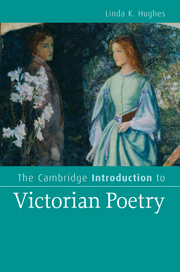Book contents
- Frontmatter
- Contents
- List of figures
- Preface
- Acknowledgments
- Editions cited
- Introducing Victorian poetry
- Part I The forms of Victorian poetry
- Part II The rhetoric of Victorian poetry
- Introduction to Part II
- 4 Poetry, technology, science
- 5 Poetry and religion
- 6 Poetry and the heart's affections
- 7 Poetry and empire
- 8 Poetic liberties
- 9 Resisting rhetoric: art for art's sake
- Part III Coda Close readings
- Glossary
- Notes
- Further reading
- Index
- Cambridge Introductions to Literature
6 - Poetry and the heart's affections
Published online by Cambridge University Press: 05 June 2012
- Frontmatter
- Contents
- List of figures
- Preface
- Acknowledgments
- Editions cited
- Introducing Victorian poetry
- Part I The forms of Victorian poetry
- Part II The rhetoric of Victorian poetry
- Introduction to Part II
- 4 Poetry, technology, science
- 5 Poetry and religion
- 6 Poetry and the heart's affections
- 7 Poetry and empire
- 8 Poetic liberties
- 9 Resisting rhetoric: art for art's sake
- Part III Coda Close readings
- Glossary
- Notes
- Further reading
- Index
- Cambridge Introductions to Literature
Summary
These three made unity so sweet,
My frozen heart began to beat,
Remembering its ancient heat.
Alfred Tennyson, “The Two Voices” (1842)I've bedewed it with tears, and embalmed it with sighs.
'Tis bound by a thousand bands to my heart.
Eliza Cook, “The Old Arm-Chair” (Weekly Dispatch [May, 1837])I run, I run, I am gathered to thy heart.
Alice Meynell, “Renouncement” (1893)At century's end Oscar Wilde brilliantly dismantled Victorian sentiment in The Importance of Being Earnest (1895). If sentimentality remains one of the least-liked features of Victorian literature today, its appeals to the heart and preoccupation with emotion are more legible when approached in the context of Victorian religion, domestic ideology, and material conditions. The poetic prestige of Wordsworth and Keble, and the value that both placed on hearts receptive to being moved, helped legitimize appeals to the heart in poetry. Poetry had long been considered the preserve of pathos in any case through its link to song, and secular concepts of sympathy reinforced appeals to the responsive heart associated with Victorian piety. As Isobel Armstrong notes, sympathy had both a moral and aesthetic function since imaginatively identifying with another furthered moral judgment as well as one's ability to read post-Romantic lyrics and the psychologically intricate dramatic monologue. The heart in this sense was at once an organ of piety, secular morality, intellection, and aesthetic experience.
- Type
- Chapter
- Information
- The Cambridge Introduction to Victorian Poetry , pp. 167 - 190Publisher: Cambridge University PressPrint publication year: 2010

